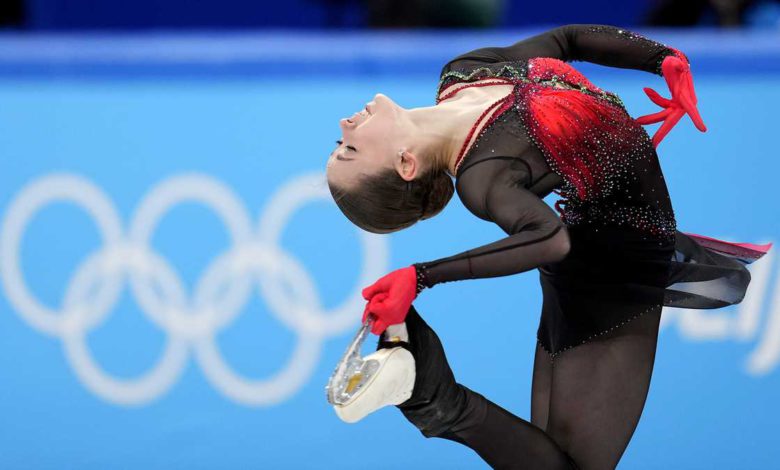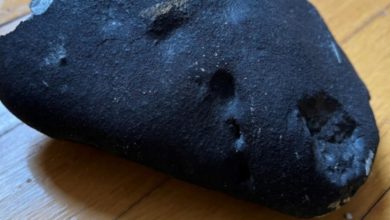

Olympic favorite Kamila Valieva tested positive for a banned heart medication before her arrival at the Beijing Olympics, the Russian newspaper RBC reported, putting in jeopardy the team gold medal that she helped win earlier this week.The sample was reportedly obtained in December, when the 15-year-old Valieva was still in Russia but did not come to light until after she had helped her team win the gold medal with dynamic performances in her short program and free skate.The drug, Trimetazidine, is used to treat angina — a type of chest pain marked by reduced blood flow to the heart — and is banned by the World Anti-Doping Agency as a stimulant. It is the same drug that was involved in a Russian bobsled case at the 2018 Olympics that ended in a settlement and the athletes accepting an eight-month ban.It is unclear whether Valieva has any heart problems. Russian athletes are in Beijing competing as the "Russian Olympic Committee" (ROC) after the country was banned because of a massive state-sponsored doping scheme at the 2014 Sochi Olympics. International Olympic Committee spokesman Mark Adams said Wednesday that "legal consultation" was required between the IOC and the International Skating Union, the world the governing body of skating. Details of the case were not specified, but Adams acknowledged that "we have athletes that have won medals involved."If the Russian team is disqualified, the U.S. team would be elevated to gold, Japan to silver and fourth-place finisher Canada — the defending champion in the team event — would receive the bronze medal.If any athlete and team is disqualified or had results nullified, an appeal is likely to follow, which could further delay the medals presentation. The Court of Arbitration for Sport has set up an office in Beijing to hear urgent cases.Valieva's status for the individual competition next week has also been cast in doubt.Reporters asked the Kremlin about the issue late Wednesday amid speculation that the gold medals won by the six Russian skaters that took part in the team competition could be at risk."Let's, for the sake of understanding, wait for some explanations either from our sports officials or from the IOC," Kremlin spokesman Dmitry Peskov said.While the Russian team dominated the competition, it was Valieva that shone brightest. Along with winning the short program and free skate, she became the first woman to land a quadruple jump in an Olympic competition, giving her team the maximum number of points while underscoring her status as the favorite in next week's individual competition.Many of the skaters that took part in the team competition, including American star Nathan Chen and Russian's Mark Kondratiuk, are due to leave Beijing shortly after competing Thursday's free skate."Everyone is doing absolutely everything that the situation can be resolved as soon as possible," Adams said, though he cautioned "as you know, legal issues can sometimes drag on."___AP Sports Writer Graham Dunbar and Associated Press writer Dasha Litvinova contributed to this report.
Olympic favorite Kamila Valieva tested positive for a banned heart medication before her arrival at the Beijing Olympics, the Russian newspaper RBC reported, putting in jeopardy the team gold medal that she helped win earlier this week.
The sample was reportedly obtained in December, when the 15-year-old Valieva was still in Russia but did not come to light until after she had helped her team win the gold medal with dynamic performances in her short program and free skate.
The drug, Trimetazidine, is used to treat angina — a type of chest pain marked by reduced blood flow to the heart — and is banned by the World Anti-Doping Agency as a stimulant. It is the same drug that was involved in a Russian bobsled case at the 2018 Olympics that ended in a settlement and the athletes accepting an eight-month ban.
It is unclear whether Valieva has any heart problems.
Russian athletes are in Beijing competing as the "Russian Olympic Committee" (ROC) after the country was banned because of a massive state-sponsored doping scheme at the 2014 Sochi Olympics.
International Olympic Committee spokesman Mark Adams said Wednesday that "legal consultation" was required between the IOC and the International Skating Union, the world the governing body of skating. Details of the case were not specified, but Adams acknowledged that "we have athletes that have won medals involved."
If the Russian team is disqualified, the U.S. team would be elevated to gold, Japan to silver and fourth-place finisher Canada — the defending champion in the team event — would receive the bronze medal.
If any athlete and team is disqualified or had results nullified, an appeal is likely to follow, which could further delay the medals presentation. The Court of Arbitration for Sport has set up an office in Beijing to hear urgent cases.
Valieva's status for the individual competition next week has also been cast in doubt.
Reporters asked the Kremlin about the issue late Wednesday amid speculation that the gold medals won by the six Russian skaters that took part in the team competition could be at risk.
"Let's, for the sake of understanding, wait for some explanations either from our sports officials or from the IOC," Kremlin spokesman Dmitry Peskov said.
While the Russian team dominated the competition, it was Valieva that shone brightest. Along with winning the short program and free skate, she became the first woman to land a quadruple jump in an Olympic competition, giving her team the maximum number of points while underscoring her status as the favorite in next week's individual competition.
Many of the skaters that took part in the team competition, including American star Nathan Chen and Russian's Mark Kondratiuk, are due to leave Beijing shortly after competing Thursday's free skate.
"Everyone is doing absolutely everything that the situation can be resolved as soon as possible," Adams said, though he cautioned "as you know, legal issues can sometimes drag on."
___
AP Sports Writer Graham Dunbar and Associated Press writer Dasha Litvinova contributed to this report.
Source link









